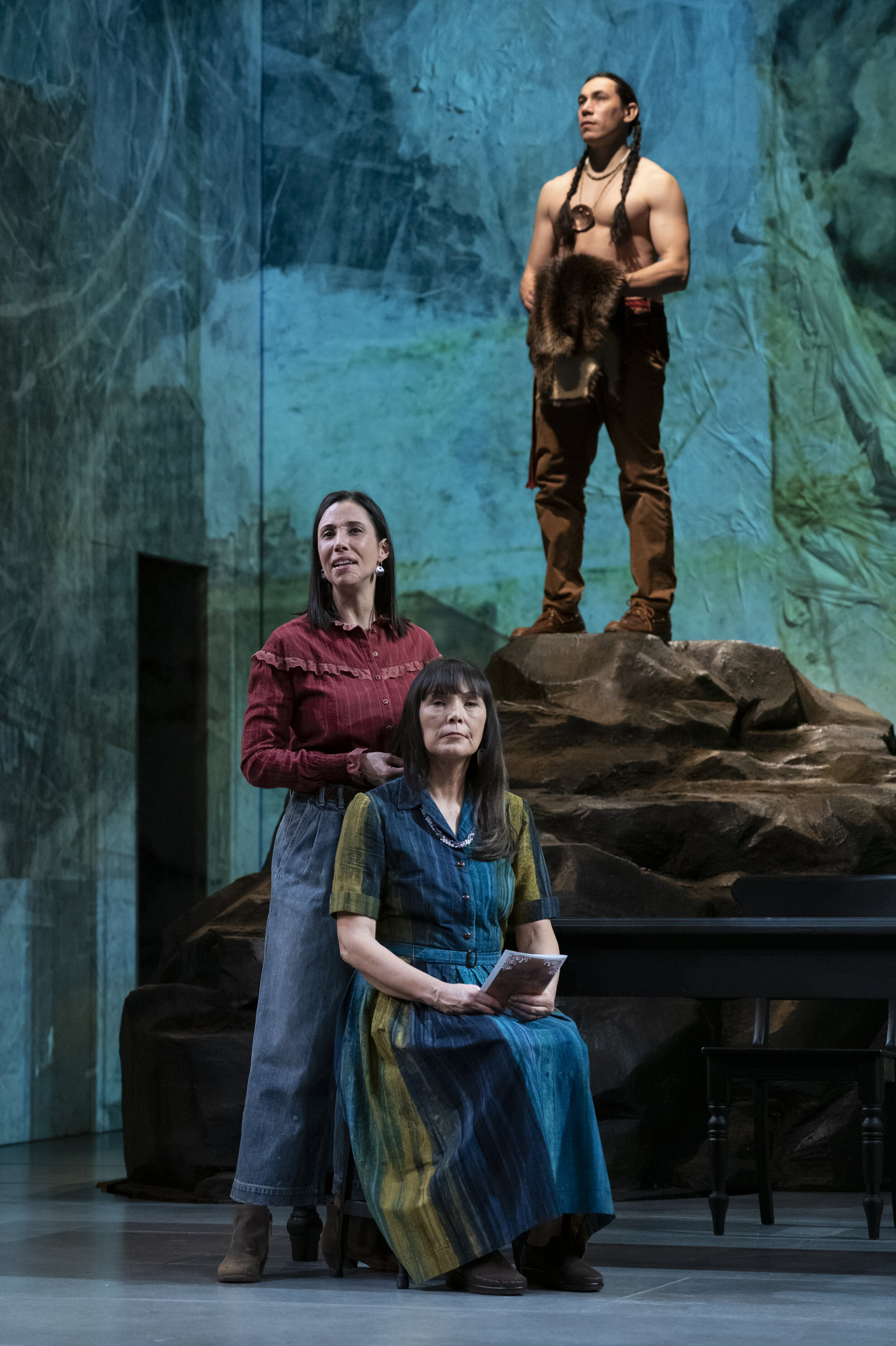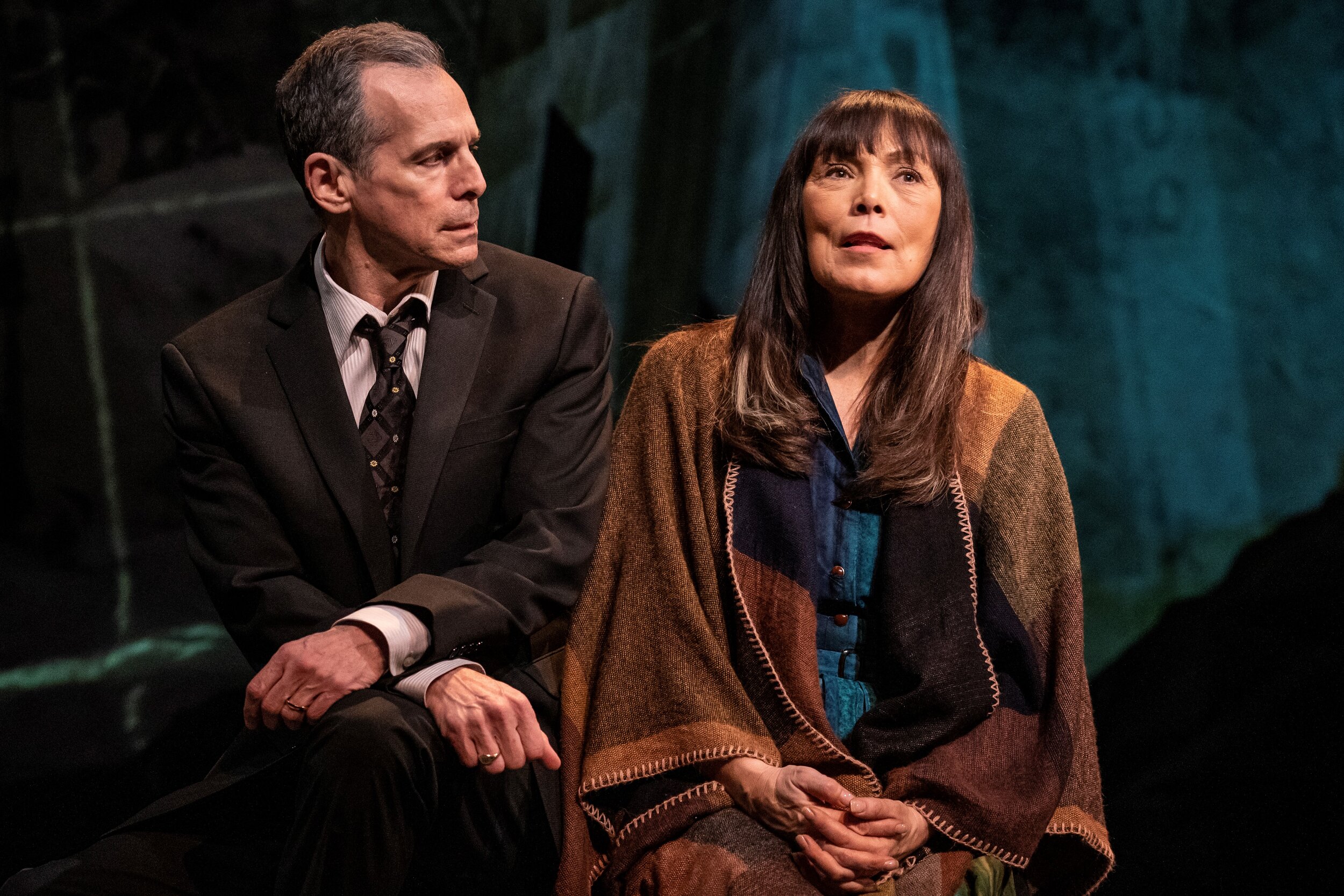Review of Manahatta, Yale Repertory Theatre
Two vexed histories circulate through Mary Kathryn Nagle’s fascinating Manahatta, now playing at Yale Repertory Theatre, directed by Laurie Woolery. In the play’s present, Jane Snake (Lily Gladstone), a descendant of the Lenape tribe that once occupied a major portion of the mid-Atlantic region of what we generally call North America, is working on Wall Street, where she becomes a rising star at Lehman Brothers about the time that it all goes bust—2008. In the past, we see how Jane’s ancestors got euchred out of the island of Manahatta by Dutch traders eager to secure land holdings. The two strains act as background—or analogies—to the other story in the present: Jane’s father, who dies during surgery while Jane is getting hired by Joe (Danforth Comins), leaves to her mother, Bobbie (Carla-Rae), enormous bills and scant means to meet them. The ultimate fate of the family’s home in Oklahoma is the point to be decided; history has already shown us what happened to Manahatta and Lehman Brothers.
Jakob (Danforth Comins), Se-ket-tu-may-qua (Steven Flores), Le-le-wa’-you (Lily Gladstone), Peter Minuit (Jeffrey King), Toosh-ki-pa-kwis-i (Shyla Lefner), Mother (Carla-Rae) in Manahatta at Yale Repertory Theatre (photo by Joan Marcus)
And yet. The play’s nimble overlaps urge us to relive these pivotal moments in our nation’s history with at least some consideration of the Lenape’s perspective. Laurie Woolery’s inventive staging of the play does much to help achieve a porous, simultaneous effect. Huge boulders grace Mariana Sanchez’s scenic design in which a sturdy table can anchor scenes separated in space and time. A beautiful backdrop of forests is lit or projected upon to create eye-entrancing spaces that suggest the wonders of our land before development (Emma Deane, lighting; Mark Holthusen, projections), only to become a riot of numbers and digital phrases. An image of Se-ket-tu-may-qua (aka Black Beaver) hovers over the proceedings. In Nagle’s play, this leader of the Lenape in Oklahoma is the descendant of the Native American who rather unwittingly trades away Manahatta when, we suppose, he really thought he was giving hunting permits.
Jane (Lily Gladstone), Dick Fuld (Jeffrey King), Joe (Danforth Comins) in Manahatta at Yale Repertory Theatre (photo by Joan Marcus)
Scenes in the present quickly shift to the past and back again as every actor plays a character in each time period. The most interesting overlap in that regard is Jeffrey King’s dual role as Peter Minuit, who brokers that major real estate steal, and as Dick Fuld, the man at the helm when Lehman went under. In both roles he’s apt to seal a deal with his own very fine brandy, but it’s as Fuld that he adds considerably to the show’s brio, giving the CEO a kind of devil-may-care grasp of how tenuous being on top can be.
Peter Minuit (Jeffrey King), Jakob (Danforth Comins), Le-le-wa’-you (Lily Gladstone) in Manahatta at Yale Repertory Theatre (photo by Joan Marcus)
Another strong double role goes to Lily Gladstone as both Jane and Le-le-wa’-you. It’s not a sense of tribal ways or historical injustices that drive her as Jane, but rather her grasp of mathematics (there’s a somewhat fatuous sense that she alone adds math capabilities to a group of guys content merely to compute appreciation). Jane is winning, charming and smart, and seems fully on her way to a Working Girl (1988) moment of showing that under-represented populations can succeed in the white man’s world of cut-throat capitalism. As Jane’s ancestor Le-le-wa’-you, she amazes the Dutch by learning English and being able to trade. In both eras, Gladstone’s character is a comer.
Debra (Shyla Lefner), Bobbie (Carla-Rae), Se-ket-tu-may-qua (Steven Flores) in Manahatta at Yale Repertory Theatre (photo by Joan Marcus)
At the heart of the play is Carla-Rae’s Bobbie. She is about as far removed from the world where her daughter succeeds as can be, in part because Bobbie still considers the land as her ancestors understood it—which means past and present center in her as someone who will never see ownership as a matter of contracts and rights and payments. Her supportive but at times head-shaking daughter Debra (Shyla Lefner) is the character most concerned that Lenape language and customs continue in the 21st century. The play’s strong sense of how the Lenape move and speak and gesture (Ty Defoe, movement director), and of how they conduct themselves—whether in trading furs or accepting or giving wampum—adds human interest to the play’s rich theatrical space, as when Le-le-wa’-you extends her foot into a space where Paul James Prendergast’s sound design creates a running brook. Costumes, by Stephanie Bahniuk, brilliantly transition with ease between times and places and cultures.
Some elements of the production don’t fully jive—such as Steven Flores’ performance as Luke, a male admirer of Jane; the pair went to school together and Flores plays Luke as though he’s still in high school while Jane is poised and professional. Flores fares better in the past as Se-ket-tu-may-qua who seems exemplary of the tribe’s dignity, and his ultimate fate foreshadows theirs.
Michael (T. Ryder Smith), Bobbie (Carla-Rae) in Manahatta at Yale Repertory Theatre (photo by Joan Marcus)
Other aspects of the play jive in a way that feels more than a bit contrived. It’s good to see T. Ryder Smith back at the Rep after his notable performance in Scenes of Court Life (2016) and here he helps bring needed nuance to a role that invites clichés of prejudice. As Michael, he’s both a church warden and a banker—so that we may see how he leeches away Bobbie’s property as well as her spiritual separatism; in the past, he’s Jonas Michaelius, the first clergyman of the Dutch in North America, who set about “saving” the natives’ children. In both cases, he seems to be present mostly to suggest that Christianity and toxic capitalism go hand-in-hand.
Provocative and fast-paced, Manahatta, which debuted at the Oregon Shakespeare Festival, does better at bringing together the worlds of Manahatta, in the 17th century, and Manhattan, in the 21st than it does at bridging the Manhattan and Oklahoma of 2008. The history in which Se-ket-tu-may-qua and his descendants figure is but sketchily suggested and there’s a sense that the story of Bobbie and Debra exists to provide a homeland backdrop to the reconquest of Manhattan by Jane. And yet, as a New York story, Manahatta isn’t likely to command much urgent attention from twenty-first-century inhabitants of the place.
Jane Snake (Lily Gladstone) in Manahatta at Yale Repertory Theatre (photo by Joan Marcus)
Manahatta
By Mary Kathryn Nagle
Directed by Laurie Woolery
Movement Director: Ty Defoe; Scenic Designer: Mariana Sanchez; Costume Designer: Stephanie Bahniuk; Lighting Designer: Emma Deane; Composer and Sound Designer: Paul James Prendergast; Projection Designer: Mark Holthusen; Hair and Wig Designer: Matthew Armentrout; Production Dramaturg: Madeline Charne; Technical Director: Yaro Yarashevich; Lenape Cultural Consultant: Joe Baker; Vocal and Dialect Coach: Louis Colaianni; Fight Director: Rick Sordelet; Stage Manager: Julia Bates
Cast: Carla-Rae, Danforth Comins, Steven Flores, Lily Gladstone, Jeffrey King, Shyla Lefner, T. Ryder Smith
Yale Repertory Theatre
January 24-February 15, 2020





